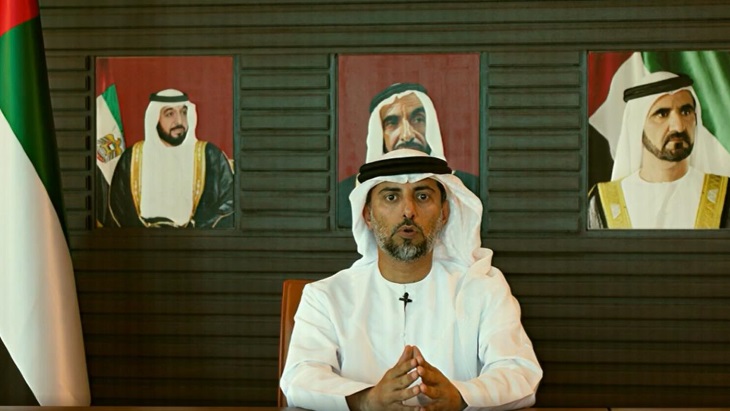The strategy, launched in 2017, aims to increase the contribution of clean energy in the total energy mix from 25% to 50% by 2050, and reduce the carbon footprint of its power generation by 70%. To achieve this, it targets an energy mix of 44% renewables, 38% gas, 12% clean coal, and 6% nuclear.
"The UAE is in the business of breaking records in solar energy," Al Mazroui said. "While we have lots of hope for hydrogen as a source of storing solar energy in the future, on the nuclear front, which is also a clean form of energy, we are very pleased to see that the first reactor went to critical mode and has been integrated into the grid."
He added: "After the testing phase, it will be part of our energy stream and we are waiting for the other three plants to join as well. So, all in all, the UAE is not only talking about renewable energy."
The region's first solar-driven hydrogen electrolysis pilot plant, at the Mohammed bin Rashid Al Maktoum Solar Park, is scheduled to be up and running next month. The project is a collaboration of Siemens, DEWA and Expo 2020 Dubai. The park is expected to be the largest generator of solar energy in the world from a single location, with a capacity to 5000 MWe by 2030.
A consortium led by Abu Dhabi National Energy Company and Masdar, with partners EDF and JinkoPower, has been awarded the contract to develop a 2 GWe solar project, which will be located about 35 kilometres from Abu Dhabi city. Once fully operational, the Al Dhafra Solar PV project will increase Abu Dhabi’s solar power capacity to about 3.2 GWe.
Al Mazroui noted that, in June, the Abu Dhabi Power Corporation had announced the lowest tariff for solar energy in the world - USD1.35 cents/kWh (AED4.97 fils/kWh in local currency). This is about 44% lower than the tariff set three years ago for the Noor Abu Dhabi project - Abu Dhabi’s first large-scale solar 1.2 GWe PV project. The new PV plant is scheduled to come online in mid-2022.
Al Mazroui described the "landmark moment" of the start-up of the first unit at the Barakah nuclear power plant in Abu Dhabi in his statement to the 64th International Atomic Energy Agency General Conference on 21 September. Barakah-1 is the first unit in operation in the Arab world.
The achievement was the result of "a transparent and concise nuclear policy", he said, "coupled with tremendous efforts across a multitude of national institutions and stakeholders, and the solid support of international partners, like the IAEA".
This close cooperation had contributed to the development of "a comprehensive nuclear infrastructure", he said, that included 12 IAEA review missions covering, among other areas, nuclear safety and nuclear safeguards.
"We wish to underscore the importance of countries which possess widespread nuclear energy activities to abide by the various nuclear conventions. We welcome efforts made by the IAEA in reaching international consensus as to the application of the Convention on the Physical Protection of Nuclear Material in full implementation of its provisions," he said.
"In terms of verification, we underscore the importance of additional protocols, in addition to the Comprehensive Safeguards Agreement, that complement each other and constitute the activities of the safeguards system. We stress the importance of full compliance with the Agency's verification measures to give the regional assurances and confidence as to the exclusively peaceful nature of nuclear activities in Member States."





_83147.jpg)
_87299.jpg)
_52351.jpg)







